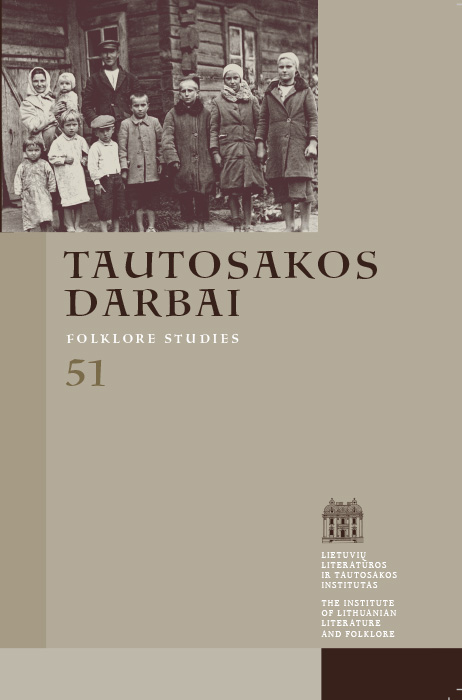Proverbs from Childhood: International Research of Children’s Speech and Thinking in the 20th Century
Abstract
The article focuses on the proverbs used in the families for didactic purposes in the traditional society of the first two decades of the 20th century, along with specific aspects of the children’s thinking and their capacity to understand the figurative metaphoric speech. Psychologists and psycholinguists interested in these problems (like Jean Piaget and others) attempted establishing the age that children started understanding the figurative meaning of the proverbs. The author of the article surveys the main international research of this type carried out in the 20th century, discussing advantages and disadvantages of the experimental methods, commenting on the achieved conclusions, and emphasizing the importance of the context for the perception of proverbs.
In the second part of the article, the author introduces the attitude of the anthropologists / folklorists towards the situation of the child and the proverb, maintaining that artificial conditions that the child is placed in during the experiment can never replicate the natural situation and communication in the family. Discussion and interpretation of the latter started since the second half of the 20th century (works by Ruth Finnegan, Charles Briggs, etc.). The author pays special attention to the study by Liisa Granbom-Herranen, investigating proverbs from childhood in the verbal culture of the traditional Finnish rural community. The researcher collected her material from the written sources exclusively, i.e. from the memoirs of the informants born no later than 1930, looking for the episodes of the pedagogical discourse in them (especially proverbs used for pedagogical purposes along with their contexts – situational, social, and cultural). The Finnish paremiologist made rather unexpected conclusions, maintaining that children mostly perceived the proverbs used in the family in quite emotional way. This could be due to the activity that they were engaged in at the particular moment (the situation that required disciplining) and confrontation with the grown-up person uttering the proverb, whose emotional connection with the child determined the intensity of the experience for the latter. Paradoxically, the wording of the proverb and the beauty of the metaphor were almost meaningless to the children (the meaning of the proverbs was frequently lost on them entirely, or received “childish” interpretations). The Finnish paremiologist illustrated her research with ample empiric material proving that in the traditional community, the children’s reaction to the proverbs that they heard and the intensive emotions that they experienced in connection with them was a consistent rather than an accidental phenomenon. Granbom-Herranen also devised a hierarchic thematic scheme for the proverbs that she investigated (including work, the Christian way of living, self-discipline, etc.). According to her, this scheme essentially corresponded to the official pedagogical rules and regulations established in the Finnish autonomous grand duchy of Russia at the time.
The article also provides illustrations from the accumulated Lithuanian material, including examples of the “childish” interpretations of the Lithuanian proverbs. This allows for marking the dotted parallel line between Finland and Lithuania, indicating fruitfulness of the prospective comparative research, and suggesting presumable thematic of the Lithuanian proverbs used for pedagogical purposes (e.g., mythopoetic worldview, patriotism) that could be obscure in the traditional Finnish society. The detailed comparison of the relative Finnish and Lithuanian data could doubtless reveal numerous interesting facts.
Downloads
Most read articles by the same author(s)
- Giedrė Bufienė, Still Waters: Symbolism of the Image in Lithuanian and Slavic Paremias , Tautosakos darbai: Vol. 50 (2015)
- Giedrė Bufienė, The Knight of the Proverbial Land , Tautosakos darbai: Vol. 47 (2014)
- Giedrė Bufienė, The Friends’ Gift to Arvo Krikmann , Tautosakos darbai: Vol. 48 (2014)
